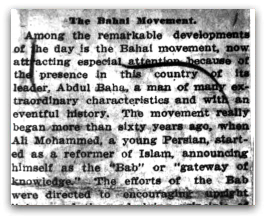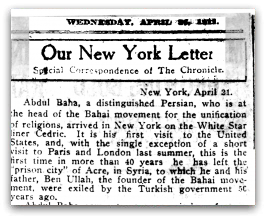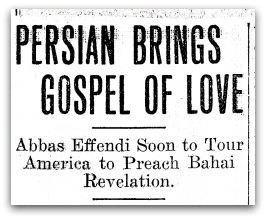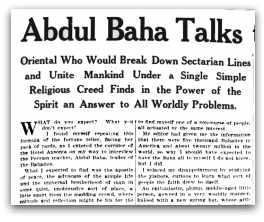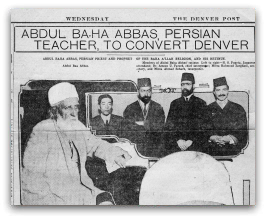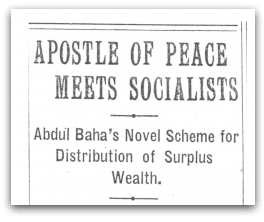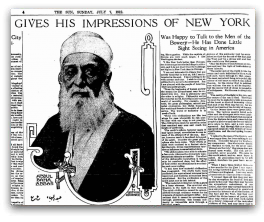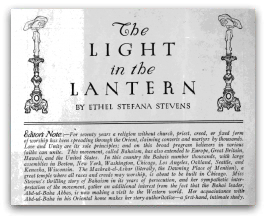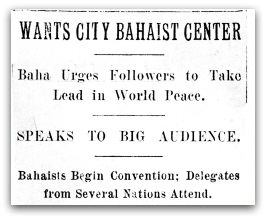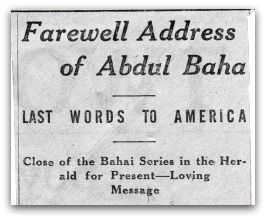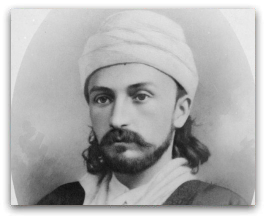Main menu
- ‘Abdu’l-Bahá’s Journey
- World Peace
- Stopping Racism in America
- Empowerment of Women
- More Principles...
- Prayer for America
World Peace

Perhaps the most prominent social message that ‘Abdu’l-Bahá brought to the West was the need for international peace, which he called “the most momentous question of this day.” While much of the popular discussion involved the political requisites to peace, ‘Abdu’l-Bahá focused on social and spiritual issues, linking universal peace with such topics as women’s suffrage, a world tribunal, collective security, the necessity of religious unity and the need for justice.

In 1912, the leadership of Europe was quietly preparing for war even as it publicly celebrated peace.
An international movement for peace was gaining supporters from all levels of society. Political leaders and influential thinkers were all involved in a movement that represented a ground-swell of interest in world peace, with publications, conferences and facilities, several of which were visited by ‘Abdu’l-Bahá during his travels.
At the same time nations around the world were stockpiling large arsenals in preparation for another war, and ‘Abdu’l-Bahá noted this development in an interview for the Montreal Daily Star:
“These warlike preparations will necessarily culminate in a great war. The very armaments themselves are productive of war. This great arsenal must go ablaze.”
While there were many who foresaw the war, and some like ‘Abdu’l-Bahá who recognized in the Balkans a “world-enkindling fire,” the scope of the violence and tragedy of World War I was a shock to the entire world.
Amidst the gathering clouds of war, ‘Abdu’l-Bahá pointed toward the dawn of an era of peace:
“Although this dawn light is dim and pale, a wise man who views the march of the sunrise at its very beginning can foretell the ascendancy of the sun in its full glory and effulgence…this twentieth century is the dawn, or beginning, of spiritual illumination, and it is evident that day by day it will advance.”
News headlines often hailed ‘Abdu’l-Bahá in terms such as the “Apostle of Universal Peace and Brotherhood,” the “Persian Peace Advocate,” the “Prophet of Peace” and similar appellations. He spoke of the need for peace and the means of its achievement, not only to the conferences and groups devoted to that cause, but also in churches, to socialist groups, public gatherings and individuals, whether famous and influential or completely unknown.
Women and world peace
One of the issues that ‘Abdu’l-Bahá most often linked with international peace was the education and advancement of women, saying that “when women participate fully and equally in the affairs of the world, when they enter confidently and capably the great arena of laws and politics, war will cease; for woman will be the obstacle and hindrance to it.” He even stated that “the education of women is of greater importance than the education of men,” as they are the first educators of the children. In the course of the journey, ‘Abdu’l-Bahá interacted with several women who were already on their way to becoming leaders in the international peace movement, and spoke at the Hull House in Chicago, which was founded by Jane Addams, perhaps the most famous woman in the peace movement.
A world tribunal : collective security and peace
‘Abdu’l-Bahá also mentioned often the goal, set down in the writings of Bahá’u’lláh, of gathering all nations under a single federal system, with a world tribunal for adjudicating all disputes, and a system of collective security for enforcing its decisions: “when we have the interparliamentary body composed of delegates from all the nations of the world and devoted to the maintenance of agreement and goodwill, the utopian dream of sages and poets, the parliament of man, will be realized.”
Peace : an outcome of spiritual power
While ‘Abdu’l-Bahá promoted and encouraged all efforts towards peace, He also indicated that “It is self-evident that the unity of the human world and the Most Great Peace cannot be accomplished through material means. They cannot be established through political power,” He said, “for the political interests of nations are various and the policies of peoples are divergent and conflicting. They cannot be founded through racial or patriotic power, for these are human powers, selfish and weak.” The one power that can hope to bind together all people is religion. ‘Abdu’l-Bahá taught that once freed from “adherence to forms and imitations” which are the cause of the differences between religious groups, the vital power that is religion has the capability to break down all differences between people. ‘Abdu’l-Bahá pointed to the fledgling Bahá’í community itself as an illustration:
“…the fundamentals of religion are intended to unify and bind together; their purpose is universal, everlasting peace…. In Persia Bahá’u’lláh was able to unite people of varying thought, creed and denomination. The inhabitants of that country were Christians, Muslims, Jews, Zoroastrians and a great variety of subdivided forms and beliefs together with racial distinctions such as Semitic, Arabic, Persian, Turk, etc.; but through the power and efficacy of religion Bahá’u’lláh united these differing peoples and caused them to consort together in perfect agreement. Such unity and accord became manifest among them that they were considered as one people and one kind.”
The Bahá’í community : a model for peace
After a century of growth and development around the world, the Bahá’í community is still a testament to that power. With members from every national, racial, religious, class and linguistic background, all working together under a leadership elected in what is quite possibly the world’s first international democratic process, the Bahá’í community is a model of the watchword “unity in diversity” and represents a cross-section of humanity, working to fulfill the wishes that ‘Abdu’l-Bahá expressed on the day that He left America’s shores for the last time:
“As to you: Your efforts must be lofty. Exert yourselves with heart and soul so that, perchance, through your efforts the light of universal peace may shine and this darkness of estrangement and enmity may be dispelled from amongst men, that all men may become as one family and consort together in love and kindness, that the East may assist the West and the West give help to the East, for all are the inhabitants of one planet, the people of one original native land and the flocks of one Shepherd.”













